Big Red Book
Celebrating television's This Is Your Life
14 November 1970
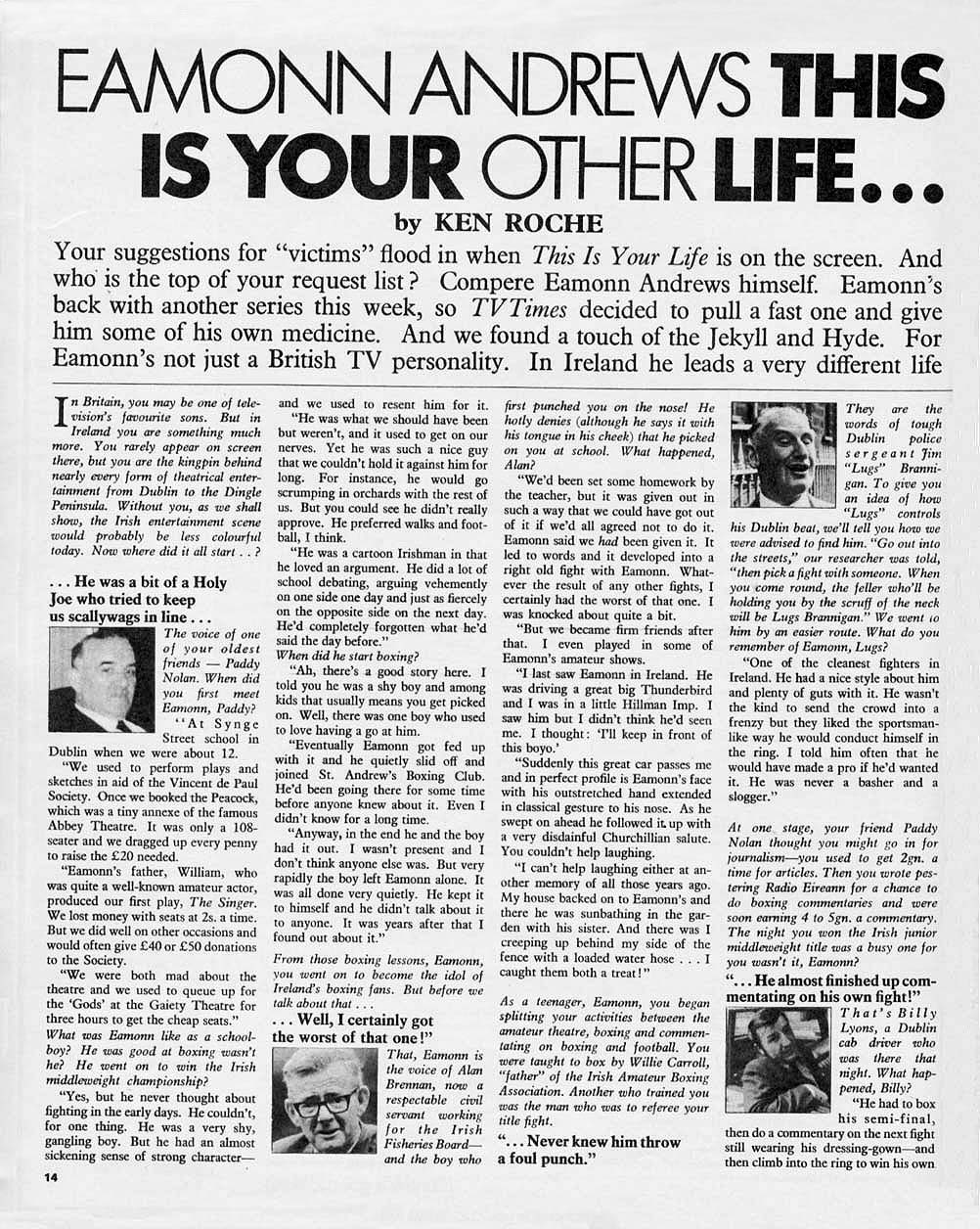
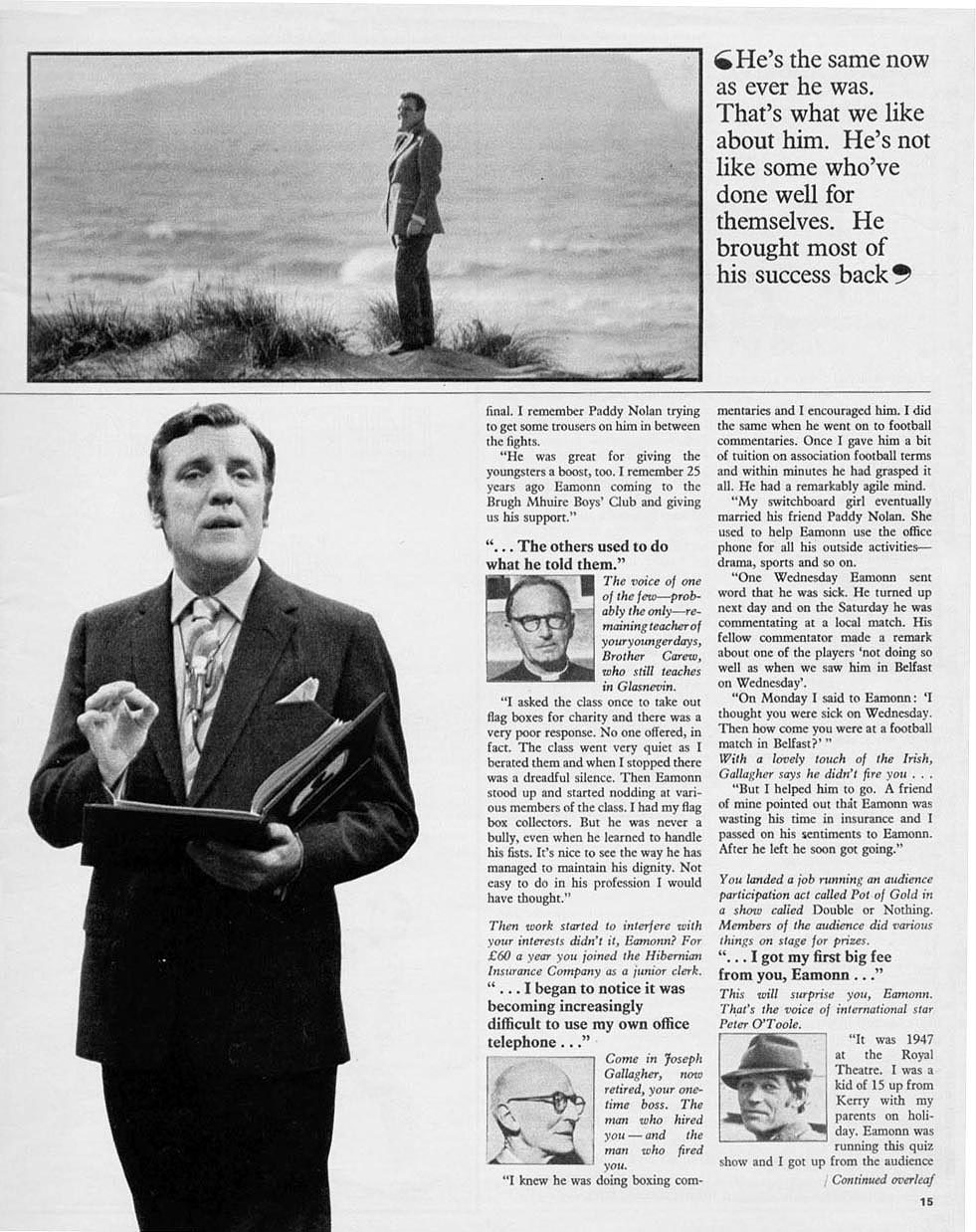
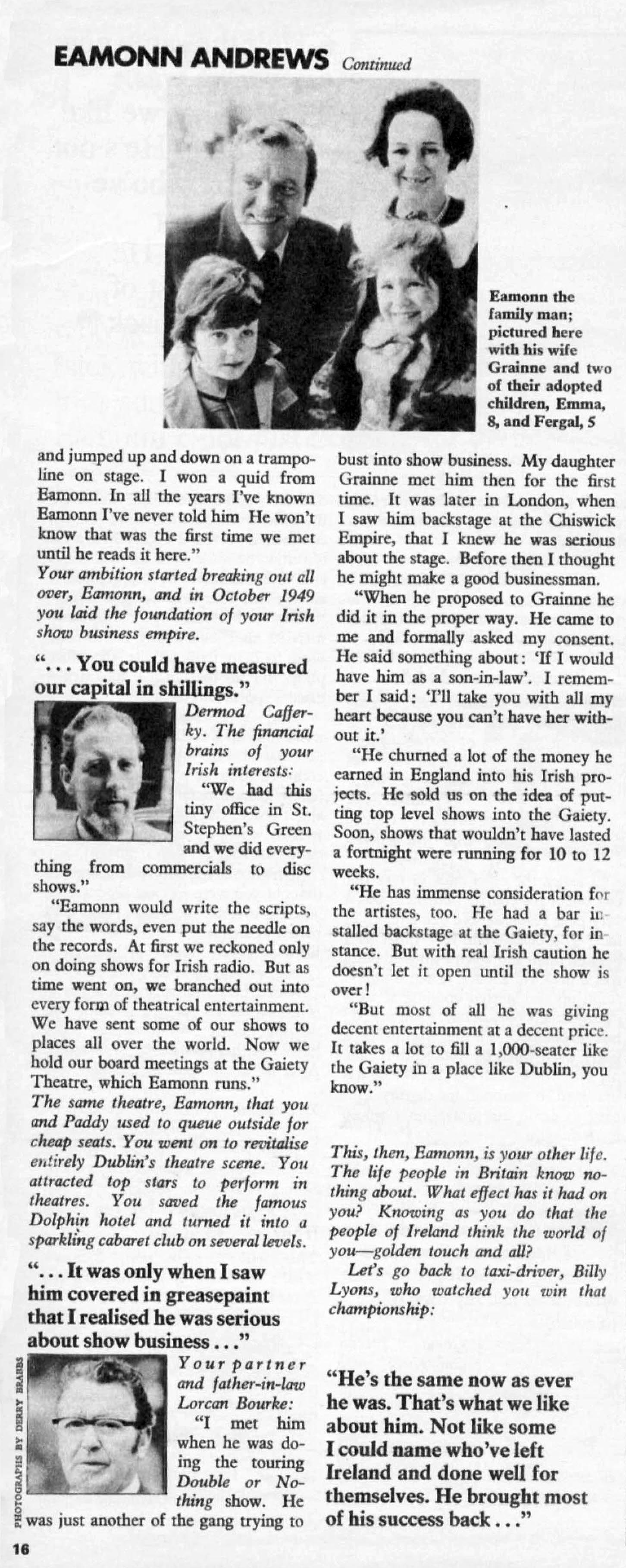
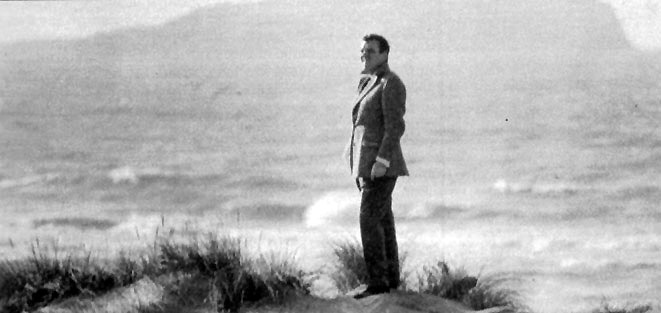
'He's the same now as ever he was. That's what we like about him. He's not like some who've done well for themselves. He brought most of his success back'
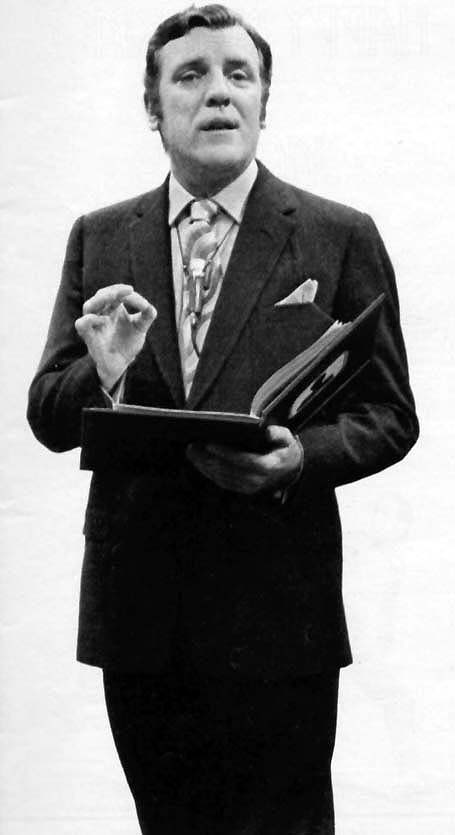
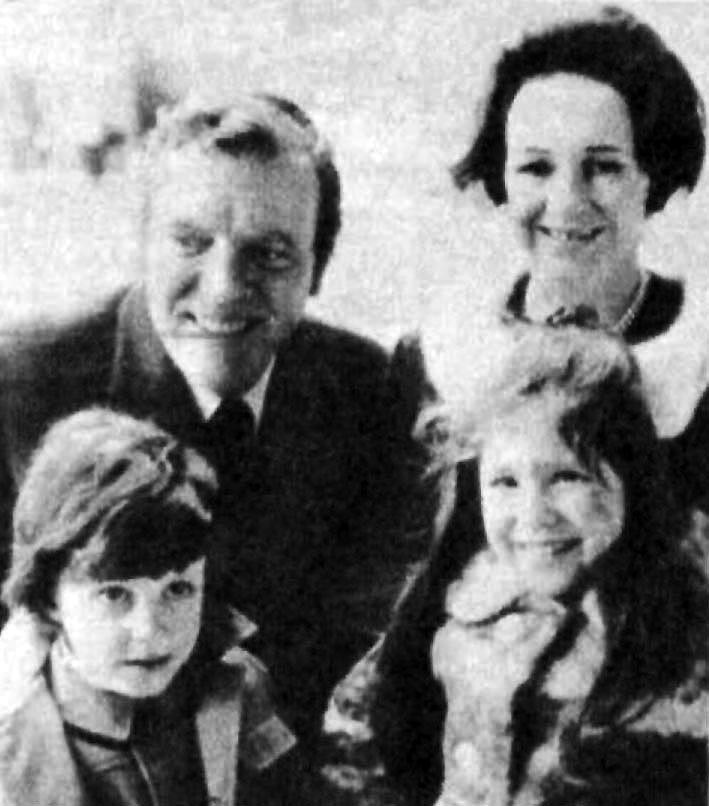
Eamonn the family man; pictured here with his wife Grainne and two of their adopted children, Emma, 8, and Fergal, 5
a brief biography
The Legend That Was Eamonn Andrews
a celebration to mark the presenter's centenary year
by Ken Roche
Your suggestions for "victims" flood in when This Is Your Life is on screen. And who is top of your request list? Compere Eamonn Andrews himself. Eamonn's back with another series this week, so TV Times decided to pull a fast one and give him some of his own medicine. And we found a touch of Jekyll and Hyde. For Eamonn's not just a British TV personality. In Ireland he leads a very different life.
In Britain, you may be one of television's favourite sons. But in Ireland you are something much more. You rarely appear on screen there, but you are the kingpin behind nearly every form of theatrical entertainment from Dublin to the Dingle Peninsula. Without you, as we shall show, the Irish entertainment scene would probably be less colourful today. Now where did it all start...?
"...He was a bit of a Holy Joe who tried to keep us scallywags in line..."
The voice of one of your oldest friends – Paddy Nolan.
When did you first meet Eamonn, Paddy?
"At Synge Street school in Dublin when we were about 12."
"We used to perform plays and sketches in aid of the Vincent de Paul Society. Once we booked the Peacock, which was a tiny annexe of the famous Abbey Theatre. It was only a 108-seater and we dragged up every penny to raise the £20 needed."
"Eamonn's father, William, who was quite a well-known amateur actor, produced our first play, The Singer. We lost money with seats a 2s a time. But we did well on other occasions and would often give £40 or £50 donations to the Society."
"We were both mad about the theatre and we used to queue up for the 'Gods' at the Gaiety Theatre for three hours to get the cheap seats."
What was Eamonn like as a schoolboy? He was good at boxing wasn't he? He went on to win the Irish middleweight championship?
"Yes, but he never thought about fighting in the early days. He couldn't for one thing. He was a very shy, gangling boy. But he had an almost sickening sense of strong character – and we use to resent him for it."
"He was what we should have been but weren't, and it used to get on our nerves. Yet he was such a nice guy that we couldn't hold it against him for long. For instance, he would go scrumping in orchards with the rest of us. But you could see he didn't really approve. He preferred walks and football, I think."
"He was a cartoon Irishman in that he loved an argument. He did a lot of school debating, arguing vehemently on one side one day and just as fiercely on the opposite side on the next day. He'd completely forgotten what he'd said the day before."
When did he start boxing?
"Ah, there's a good story here. I told you he was a shy boy and among kids that usually means you get picked on."
"Well, there was one boy who used to love having a go at him."
"Eventually Eamonn got fed up with it and he quietly slid off and joined St Andrew's Boxing Club. He'd been going for some time before anyone knew about it. Even I didn't know for a long time."
"Anyway, in the end he and the boy had it out. I wasn't present and I don't think anyone else was. But very rapidly the boy left Eamonn alone. It was all done very quietly. He kept it to himself and he didn't talk about it to anyone. It was years after that I found out about it."
From those boxing lessons, Eamonn, you went on to become the idol of Ireland's boxing fans. But before we talk about that...
"...Well, I certainly got the worst of that one!"
That, Eamonn is the voice of Alan Brennan, now a respectable civil servant working for the Irish Fisheries Board – and the boy who first punched you on the nose! He hotly denies (although he says it with his tongue in his cheek) that he picked on you at school. What happened, Alan?
"We'd been set some homework by the teacher, but it was given out in such a way that we could have got out of it if we'd all agreed not to do it. Eamonn said we had been given it. It led to words and it developed into a right old fight with Eamonn. Whatever the result of any other fights, I certainly had the worst of that one. I was knocked about quite a bit."
"But we became firm friends after that. I even played in some of Eamonn's amateur shows."
"I last saw Eamonn in Ireland. He was driving a great big Thunderbird and I was in a little Hillman Imp. I saw him but I didn't think he'd seen me. I thought: 'I'll keep in front of this boyo.'"
"Suddenly this great car passes me and in perfect profile is Eamonn's face with his outstretched hand extended in classical gesture to his nose. As he swept on ahead he followed it up with a very disdainful Churchillian salute. You couldn't help laughing."
"I can't help laughing either at another memory of all those years ago. My house backed on to Eamonn's and there he was sunbathing in the garden with his sister. And there was I creeping up behind my side of the fence with a loaded water hose... I caught them both a treat!"
As a teenager, Eamonn, you began splitting your activities between the amateur theatre, boxing and commentating on boxing and football. You were taught to box by Willie Carroll, "father" of the Irish Amateur Boxing Association. Another who trained you was the man who was to referee your title fight.
"...Never knew him throw a foul punch."
They are the words of tough Dublin police sergeant Jim "Lugs" Brannigan. To give you an idea of how "Lugs" controls his Dublin beat, we'll tell you how we were advised to find him. "Go out into the streets," our researcher was told, "then pick a fight with someone. When you come round, the feller who'll be holding you by the scruff of the neck will be Lugs Brannigan." We went to him by an easier route. What do you remember of Eamonn, Lugs?
"One of the cleanest fighters in Ireland. He had a nice style about him and plenty of guts with it. He wasn't the kind to send the crowd into a frenzy but they liked the sportsmanlike way he would conduct himself in the ring. I told him often that he would have made a pro if he'd wanted it. He was never a basher and a slogger."
At one stage, your friend Paddy Nolan thought you might go in for journalism – you used to get 2 guineas a time for articles. Then you wrote pestering Radio Eireann for a chance to do boxing commentaries and were soon earning 4 to 5 guineas a commentary. The night you won the Irish junior middleweight title was a busy one for you wasn't it, Eamonn?
"...He almost finished up commentating on his own fight!"
That's Billy Lyons, a Dublin cab driver who was there that night. What happened, Billy?
"He had to box his semi-final, then do a commentary on the next fight still wearing his dressing-gown – and then climb into the ring to win his own final. I remember Paddy Nolan trying to get some trousers on him in between the fights."
"He was great for giving the youngsters a boost, too. I remember 25 years ago Eamonn coming to the Brugh Mhuire Boys' Club and giving us his support."
"...The others used to do what he told them."
The voice of one of the few – probably the only – remaining teacher of your younger days, Brother Carew, who still teaches in Glasnevin.
"I asked the class once to take out flag boxes for charity and there was a very poor response. No one offered, in fact. The class went very quiet as I berated them and when I stopped there was a dreadful silence. Then Eamonn stood up and started nodding at various members of the class. I had my flag box collectors. But he was never a bully, even when he learned to handle his fists. It's nice to see the way he has managed to maintain his dignity. Not easy to do in his profession I would have thought."
Then work started to interfere with your interest didn't it, Eamonn? For £60 a year you joined the Hibernian Insurance Company as a junior clerk.
"...I began to notice it was becoming increasingly difficult to use my own office telephone..."
Come in Joseph Gallagher, now retired, your one time boss. The man who hired you – and the man who fired you.
"I knew he was doing boxing commentaries and I encouraged him. I did the same when he went on to football commentaries. Once I gave him a bit of tuition on association football terms and within minutes he had grasped it all. He had a remarkably agile mind."
"My switchboard girl eventually married his friend Paddy Nolan. She used to help Eamonn use the office phone for all his outside activities – drama, sports and so on."
"One Wednesday Eamonn sent word that he was sick. He turned up next day and on the Saturday he was commentating at a local match. His fellow commentator made a remark about one of the players 'not doing so well as when we saw him in Belfast on Wednesday'."
"On Monday I said to Eamonn: 'I thought you were sick on Wednesday. Then how come you were at a football match in Belfast?'"
With a lovely touch of the Irish, Gallagher says he didn't fire you...
"But I helped him to go. A friend of mine pointed out that Eamonn was wasting his time in insurance and I passed on his sentiments to Eamonn. After he left he soon got going."
You landed a job running an audience participation act called Pot of Gold in a show called Double or Nothing. Members of the audience did various things on stage for prizes.
"...I got my first big fee from you, Eamonn..."
This will surprise you, Eamonn. That's the voice of international star Peter O'Toole.
"It was 1947 at the Royal Theatre. I was a kid of 15 up from Kerry with my parents on holiday. Eamonn was running this quiz show and I got up from the audience and jumped up and down on a trampoline on stage. I won a quid from Eamonn. In all the years I've known Eamonn I've never told him. He won't know that was the first time we met until he reads it here."
Your ambition started breaking out all over, Eamonn, and in October 1949 you laid the foundation of your Irish show business empire.
"...You could have measured our capital in shillings."
Dermod Cafferky. The financial brains of your Irish interest:
"We had this tiny office in St. Stephen's Green and we did everything from commercials to disc shows."
"Eamonn would write the scripts, say the words, even put the needle on the records. At first we reckoned only on doing shows for Irish radio. But as time went on, we branched out into every form of theatrical entertainment. We have sent some of our shows to places all over the world. Now we hold our board meetings at the Gaiety Theatre, which Eamonn runs."
The same theatre, Eamonn, that you and Paddy used to queue outside for cheap seats. You went on to revitalise entirely Dublin's theatre scene. You saved the famous Dolphin Hotel and turned it into a sparkling cabaret club on several levels.
"...It was only when I saw him covered in greasepaint that I realised he was serious about show business..."
Your partner and father-in-law Lorcan Bourke: "I met him when he was doing the touring Double or Nothing show. He was just another of the gang trying to bust into show business. My daughter Grainne met him then for the first time. It was later in London, when I saw him backstage at the Chiswick Empire, that I knew he was serious about the stage. Before then I thought he might make a good businessman."
"When he proposed to Grainne he did it in the proper way. He came to me and formally asked my consent. He said something about: 'If I would have him as a son-in-law'. I remember I said: 'I'll take you with all my heart because you can't have her without it,'"
"He churned a lot of the money he earned in England into his Irish projects. He sold us on the idea of putting top level shows into the Gaiety. Soon, shows that wouldn't have lasted a fortnight were running for 10 to 12 weeks."
"He has immense consideration for the artistes, too. He had a bar installed backstage at the Gaiety, for instance. But with real Irish caution he doesn't let it open until the show is over!"
"But most of all he was giving decent entertainment at a decent price. It takes a lot to fill a 1,000-seater like the Gaiety in a place like Dublin, you know."
This, then, Eamonn, is your other life. The life people in Britain know nothing about. What effect has it had on you?
Knowing as you do that the people of Ireland think the world of you – golden touch and all?
Let's go back to taxi-driver, Billy Lyons, who watched you win that championship:
"He's the same now as ever he was. That's what we like about him. Not like some I could name who've left Ireland and done well for themselves. He brought most of his success back..."